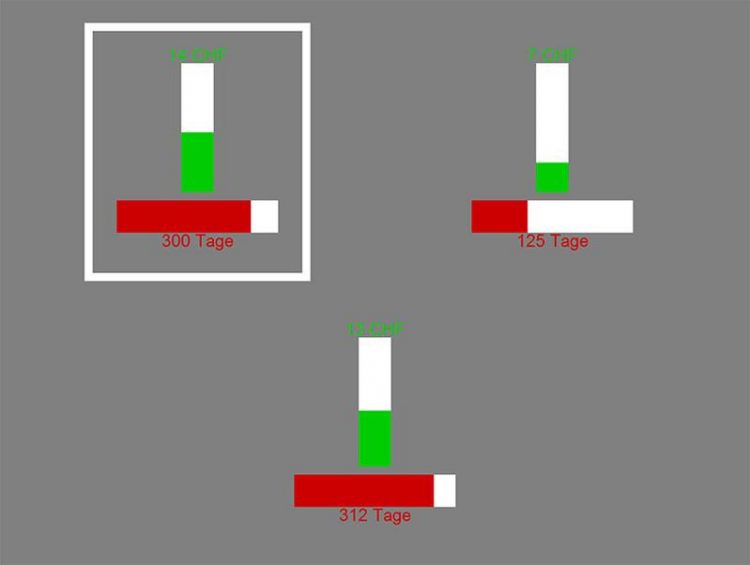The Attraction Effect: how our Brains Can Be Influenced

Participants in the experiment saw three options with the respective amounts of money (green) and waiting times (red). The white frame indicates which option the person chose. University of Basel
Classical economic models state that when faced with a decision, we always choose the option that is of greatest benefit to us, regardless of the benefits of other options. However, the latter assumption contradicts the much-researched «attraction effect». This leads us to make different decisions depending on how our situation appears at the time of the decision.
If, when buying a camera, we are presented with a choice between an expensive, high-quality model and a cheap model of low quality, the addition of a third, unattractive camera – similar in quality to the expensive camera but with a higher price – leads us to choose the expensive model. Various studies show that people choose the option from the original selection that is clearly better than the third, additional option.
Same options – different decisions
Psychologists from the University of Basel have studied the attraction effect in connection with intertemporal choices for the first time. In our everyday lives, we are frequently confronted with decisions of this kind that require us to choose whether we prefer a small advantage as soon as possible or would rather wait longer for a greater advantage (an example is the conflict between the immediate enjoyment of a piece of cake and a long-term diet).
In the study, a group of students solved numerous decision-making tasks on a computer. They were faced with a conflict between receipt of smaller amounts of money in a short time or larger sums at a later point in time. In order to create real decision-making situations, a selected sum of money was transferred to the students’ bank accounts at the appropriate point in time. This experiment allowed the researchers to demonstrate the attraction effect: although the subjects were essentially making a choice between the same two alternatives, their decisions were influenced by the presence of a third, irrelevant option.
Measuring satisfaction and effect in the brain’s reward system
A second group of students saw the same combinations of money and time while an MRI scanner took a scan of their brain. The subjects were not able to make decisions actively; rather, an option was assigned to them at random. After the MRI scan, they reported their satisfaction with the outcome of the random selection.
Here, too, the subjects were susceptible to the attraction effect, reporting different levels of satisfaction with the outcome, depending on the options they were shown. In subjects who were particularly satisfied, and therefore subject to a strong attraction effect, the researchers observed through the scan an above-average effect in the brain’s reward system.
Interdisciplinary research
The results of this research are based on a combination of different branches of science. «Our study spans the interface between neuroscience, psychology and economics», explains Prof. Sebastian Gluth, lead author of the study. «The results therefore invite further research, but they are also discussed, for example, in terms of their practical applications in marketing.»
Original source
Sebastian Gluth, Jared M. Hotaling, Jörg Rieskamp
The Attraction Effect Modulates Reward Prediction Errors and Intertemporal Choices
The Journal of Neuroscience (2017), doi: 10.1523/jneurosci.2532-16.2017
Further information
Prof. Dr. Sebastian Gluth, University of Basel, Faculty of Psychology, Tel. +41 61 207 06 06, email: sebastian.gluth@unibas.ch
Media Contact
More Information:
http://www.unibas.chAll latest news from the category: Interdisciplinary Research
News and developments from the field of interdisciplinary research.
Among other topics, you can find stimulating reports and articles related to microsystems, emotions research, futures research and stratospheric research.
Newest articles

You are What You Eat—Stanford Study Links Fiber to Anti-Cancer Gene Modulation
The Fiber Gap: A Growing Concern in American Diets Fiber is well known to be an important part of a healthy diet, yet less than 10% of Americans eat the minimum recommended…

Trust Your Gut—RNA-Protein Discovery for Better Immunity
HIRI researchers uncover control mechanisms of polysaccharide utilization in Bacteroides thetaiotaomicron. Researchers at the Helmholtz Institute for RNA-based Infection Research (HIRI) and the Julius-Maximilians-Universität (JMU) in Würzburg have identified a…

ASXL1 Mutation: The Hidden Trigger Behind Blood Cancers and Inflammation
Scientists show how a mutated gene harms red and white blood cells. LA JOLLA, CA—Scientists at La Jolla Institute for Immunology (LJI) have discovered how a mutated gene kicks off…



